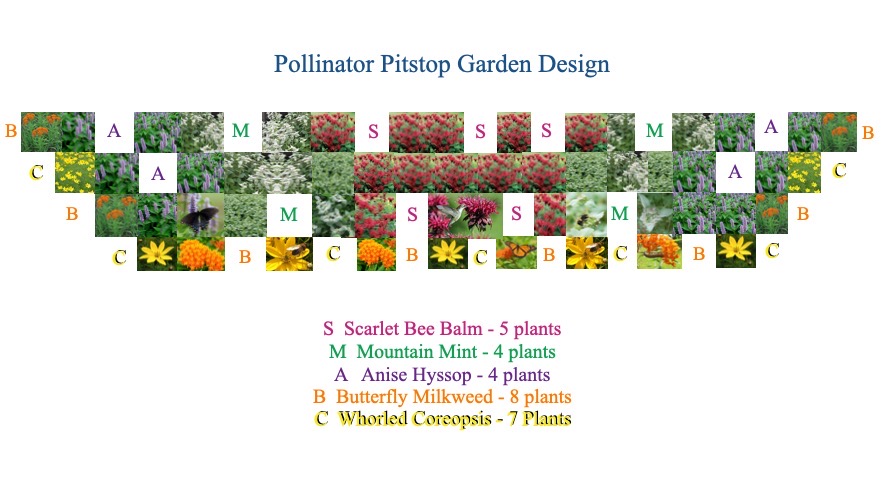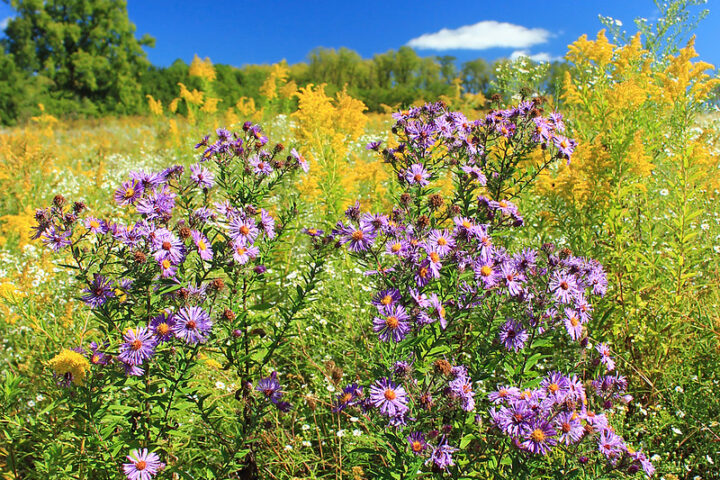by Donna Delany
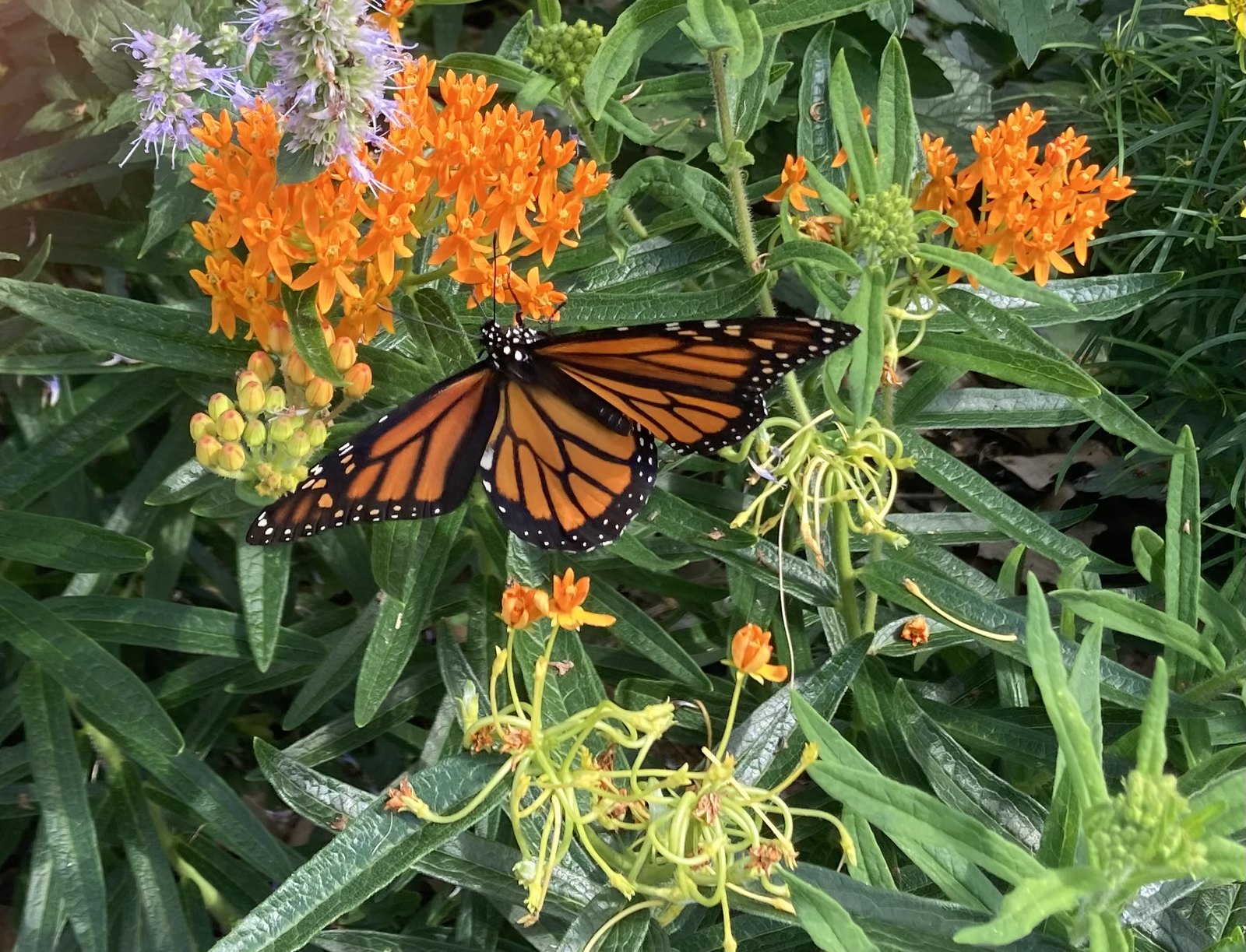
A monarch butterfly enjoying the pollinator pitstop garden of West Vincent EAC.
The West Vincent Pollinator Pitstop Program was designed by the West Vincent Environmental Advisory Council (West Vincent Township, Chester Springs, PA) to blanket our township in native flowers. The goal: to provide residents with free and low-cost native plants that benefit our pollinators and birds and beautify our world. Along the way, we hope to learn together about biodiversity, how to have less lawn to mow, how to fix wet areas, ways to keep our leaves and stormwater on our properties, organic lawns and gardens, and, especially, the physical and mental health benefits of being in and connecting with nature and our neighbors.
What we didn’t expect was how it would capture the imagination and hearts of so many people, that it would be the springboard for so many additional projects to benefit the environment.
This project began in the fall of 2021 with the preparation of our first demonstration Pollinator Pitstop Garden in Evans Park, the park in which our township building is located. The name “pitstop” was used to make the point that pollinators move around – they don’t stay in one place, and they need food wherever they go. In November 2021, we held a demonstration of the easiest way to convert lawn to garden – “the lasagna method.” We collected Amazon boxes and bagged leaves and rocks, laid out the 12’ x 4’ garden, and placed a small temporary fence around it to hold in the leaves. We then put down the cardboard, placed rocks on top to hold the cardboard down, and put a 2 foot layer of leaves on top. We let it sit for the winter with a Pollinator Pitstop Incubating sign in front (see photo below).
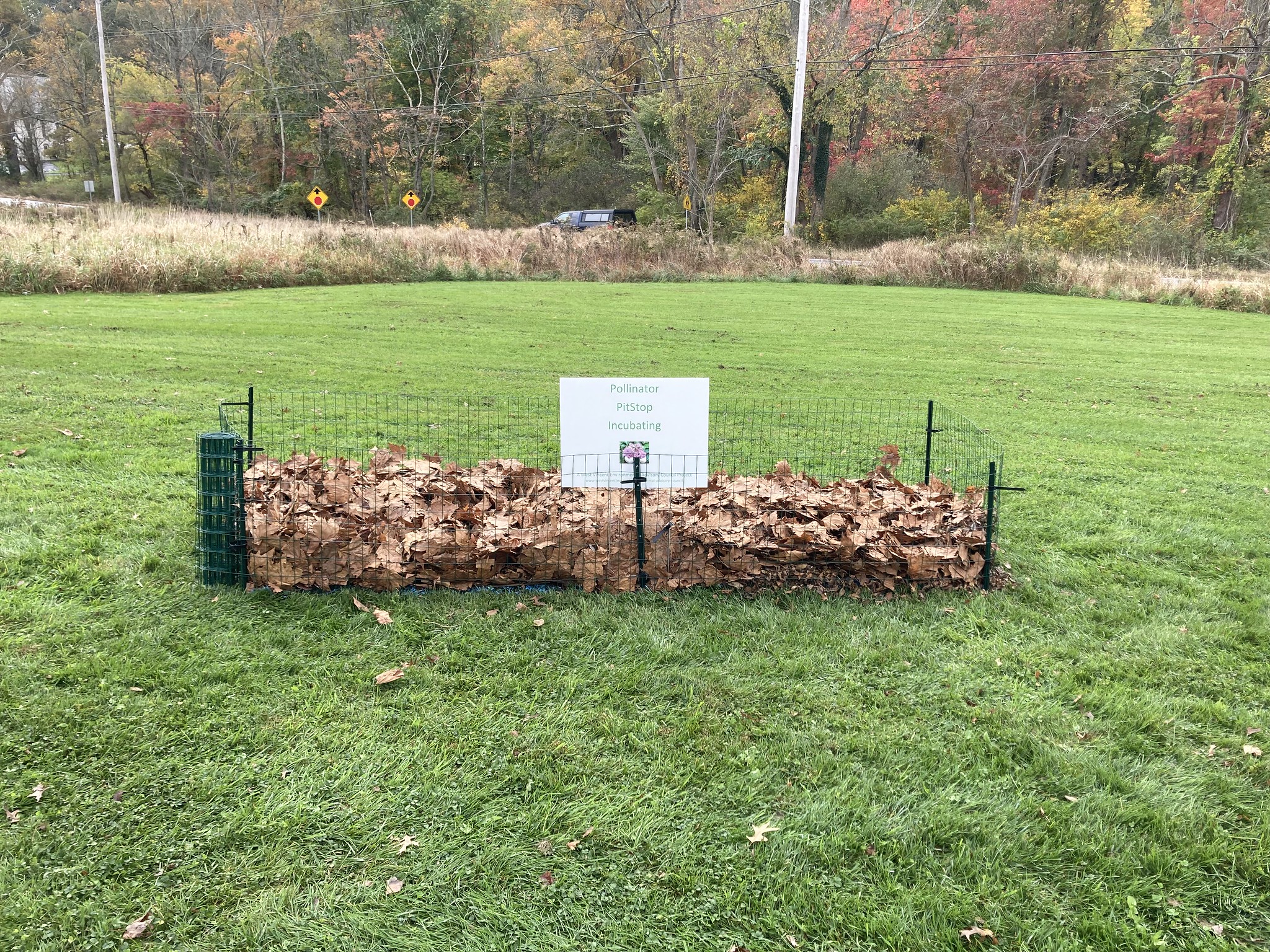
The project continued in January. The EAC held a free butterfly milkweed seed giveaway on a very cold Saturday in January. We gave out plastic milk jugs to anyone who didn’t have one, and we handed out written instructions on the Winter Sowing of milkweed, which were also posted on our webpage with an instructional video. There was a line of cars through the township parking lot, dozens of people winter-sowing native plants for the first time.
In March, the Girl Scouts planted 650 butterfly milkweed plants, which were raised inside under ideal (for milkweed) conditions so that they would bloom the first year. These plants were given away at our Community Day in mid-May, where we also held a partridge-pea seed ball activity for the kids. EAC members wore butterfly wings – we felt really goofy, but it ended up creating great energy and being a real conversation starter! We had enough plants for our township gardener to plant them throughout our park and our Community Garden space.

At the end of May, after the soil had warmed up, we finally planted the Pitstop Demonstration Garden. Our lasagna method had worked perfectly. The grass had died, the cardboard was completely gone, and there were just enough leaves left to serve as a pretty and effective mulch. The 4’ x 12’ design had been selected to be easy to reach into from the front to weed. The planting was quick and easy, as the soil under the “lasagna” was light and easy to dig in. The final step of the garden preparation was to create a border by laying down flat stones, with landscape fabric underneath, so it would be easy for the lawn crew to mow around it.
Many people showed up for the planting – some of them first time gardeners. So far, we have 180 households participating in this program. We are all gardening together and learning together. Several families purchased the full complement of Pitstop Garden plants so they could plant their own pitstop at home. The sale of these plants benefitted a local non-profit, the Ludwigs Corner Horse Show Association.
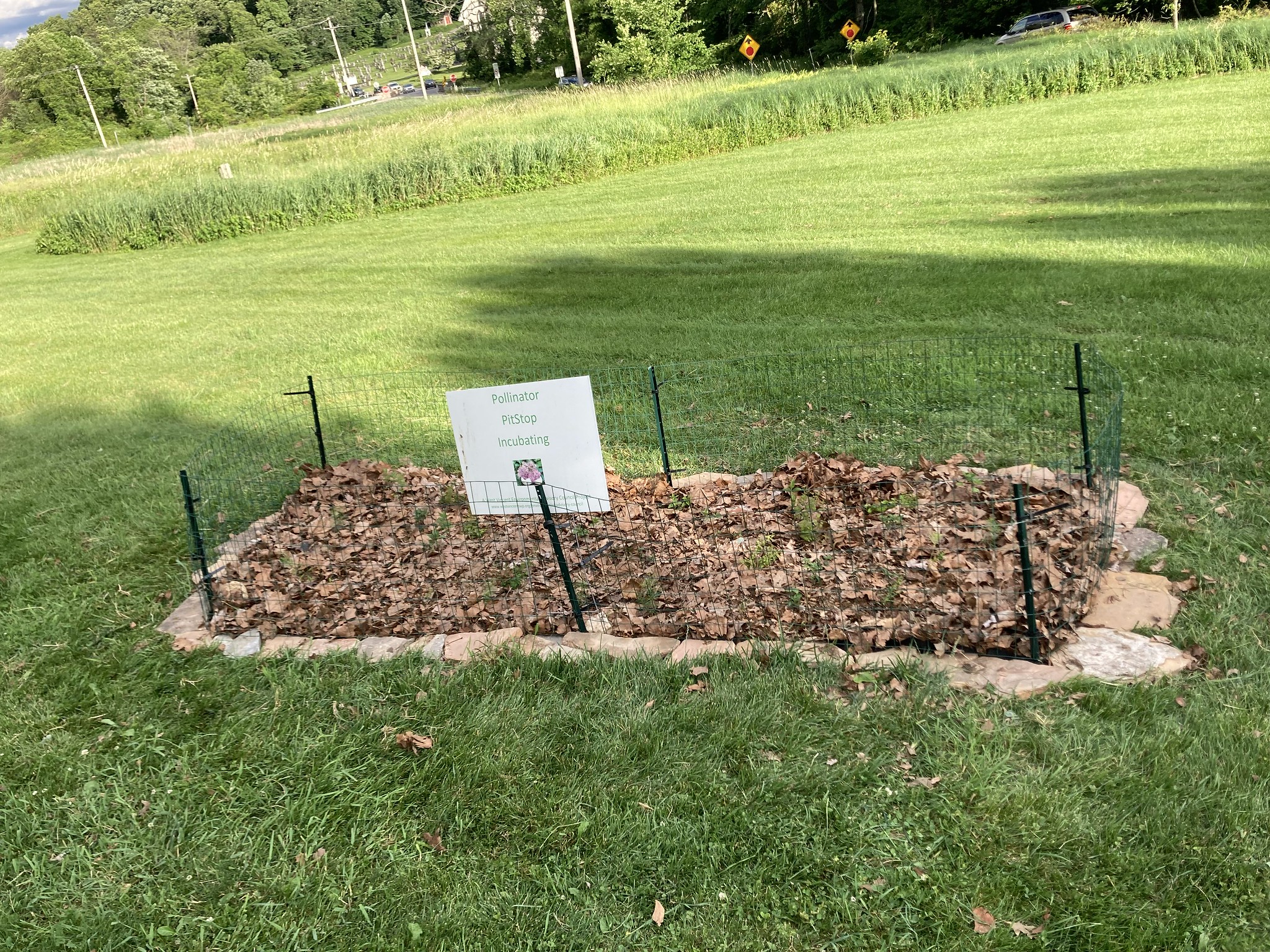
The garden thrived all summer. Thanks to the lasagna method, there were no weeds to pull other than the crabgrass that figured out how to cross our garden barrier. All the baby plants flowered profusely. Monarchs and other butterflies and pollinators feasted there. The garden is planted next to a well-used paved trail leading from the Evans Park parking lot, so park visitors got to enjoy it all summer long. This fall, we hosted another lasagna method demo in order to add more space onto the original pitstop to include fall blooming flowers.

A Phoenixville resident who grew up in West Vincent was inspired by our project to start the Phoenixville Pollinator Corridor as a Facebook Group. 135 people in Phoenixville signed up to create feeding stations for pollinators in their yards. They each provided their address, and the pollinator corridor was mapped out using Google maps. A bee was placed on each property, showing where they would have food and where there might be gaps. There is a plan to expand the map to include pollinator gardens throughout the Phoenixville region, including surrounding townships.
At the end of the 2022 school year, the West Vincent Elementary School hosted an environmental day based around our Pitstop program. Regular classes were suspended for the day, and the children participated in educational sessions mixed with hands-on learning, centered around the Monarch butterfly theme. Each child participated in seed planting, making seed balls, and creating a drawing of their version of “What Makes a Butterfly”, (sun, rain, soil, children with watering cans, etc., etc.), and the resulting 650 six-inch square drawings were woven into a paper quilt, which hangs in the school lobby.
Members of the West Vincent Elementary School staff were energized by the good feeling and the possibilities opened up by the success of their environmental day. They have formed a Nature Club for the students. They plan to engage students and teachers through reading together, hands-on projects, and outdoor programs. The school nurse feels the staff and students continue to feel the effects of the COVID pandemic and quarantine, and she sees this program as “kids healing nature – nature healing kids.” In September, members of the West Vincent EAC’s Garden Club removed non-native plants from a school garden and planted New York asters and goldenrod, to start a Pollinator Pitstop at the school. In November, the Nature Club kids created their own Pitstop using the lasagna method. The schoolyard rang with laughter as the delighted kids ripped up and placed the cardboard cartons to cover the ground like a giant puzzle. They searched for rocks dropped them on the carboard and, best of all, they got to play in huge piles of leaves. Their next step is to select the plants they will plant next spring, native plants that will bloom in spring and fall while school is in session or provide seeds and berries for birds in winter.
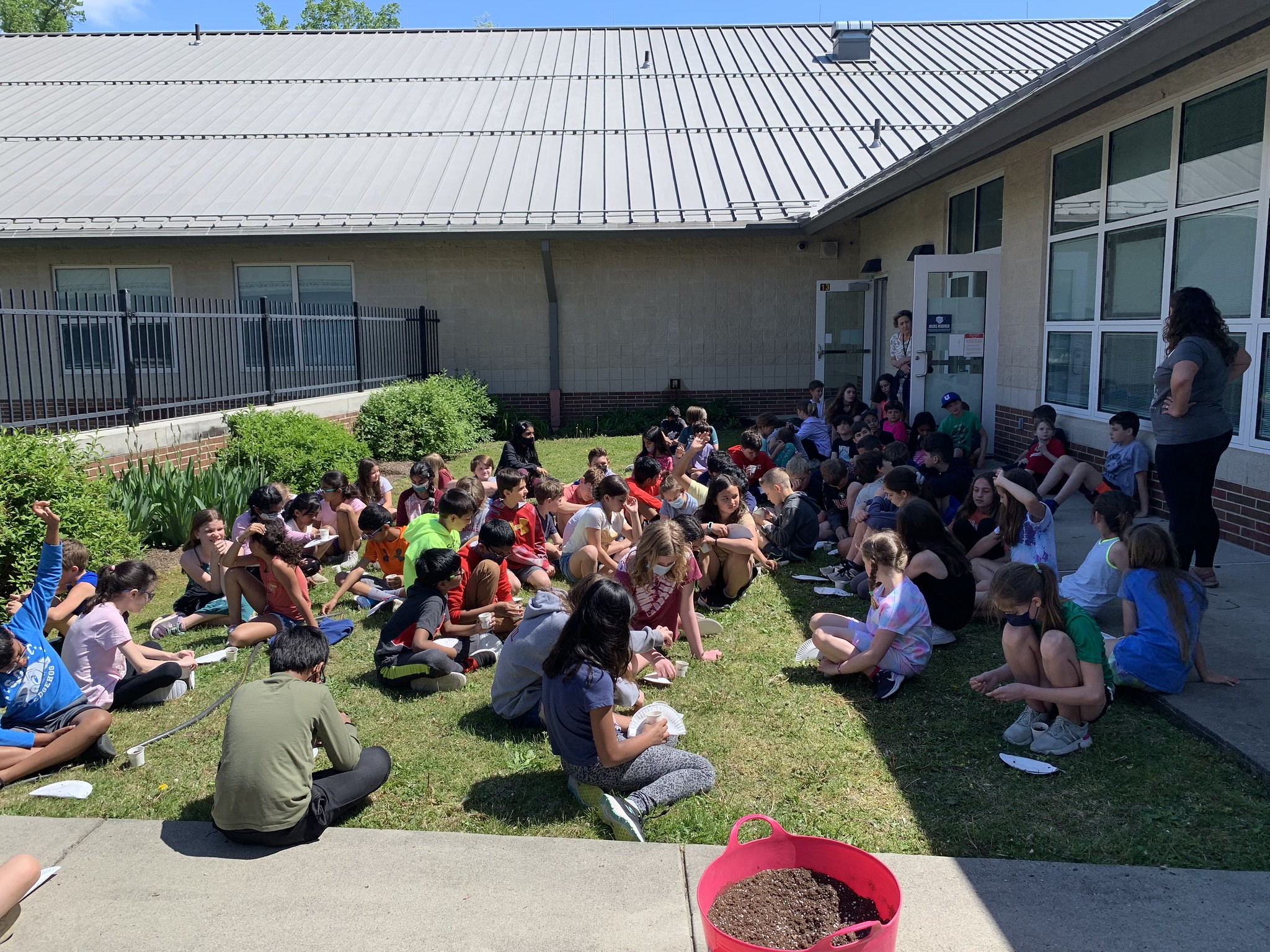
The local high school is being engaged to help the elementary students design and plant their new garden. They may grow the spring and fall blooming pollinator plants for the elementary school and township pitstops. A pollinator garden was started at the high school.
Our goals for next year include adding spring and fall pollen and nectar sources at our township park and the elementary school, including trees, and shrubs, a winter sowing project, and a native plant giveaway and/or sale. We are currently creating a Healthy Yard Recognition Program that we hope will educate and inspire a wide range of positive environmental actions, such as year round pollinator support, leaving the leaves, stormwater retention, organic growing, layering for bird habitat, leaving seed heads and berries for birds, no winter garden clean-up, composting, etc.
We feel that our community has been enriched by this program far beyond anything we imagined.
Additional information about the West Vincent Twp. EAC and their Pollinator Pitstop program can be found here.
Want to start your own pollinator pitstop? Feel free to utilize this planting map, provided by West Vincent EAC members:
